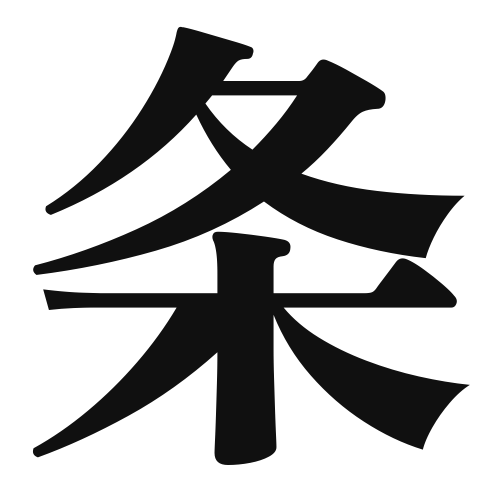1. Overview of Meaning
The kanji “条” (pronounced “jou”) generally means “strip,” “item,” or “clause.” It is often used to refer to a line or a section in a document, indicating a specific point or item within a list.
2. Formation and Radical
Formation of the Kanji: The kanji “条” is a combination of the radical “木” (tree) and the phonetic component “夭” (which suggests a meaning related to youth or vitality). This combination can be interpreted as a “branch” of a tree, which metaphorically relates to the idea of a line or item.
Radical: The radical of “条” is “木,” which is associated with trees and wood, reflecting its connection to nature and growth.
3. Examples of Usage
Common Words and Phrases: “条項” (joukou – clause), “条約” (jouyaku – treaty), “条文” (joubun – article or provision).
Example Sentences in Daily Conversation:
- この契約には三つの条項があります。 (This contract has three clauses.)
- 条約が締結されました。 (The treaty has been concluded.)
4. Synonyms and Antonyms
Similar Kanji: “項” (kou – item or section) is similar but often refers to a specific item in a list or a heading, while “条” emphasizes the idea of a line or clause.
Antonyms: “断” (dan – to cut off or sever) can be considered an opposite in the sense that it implies separation, while “条” suggests connection through lines or items.
5. Cultural and Historical Background
Relation to Japanese Culture: The kanji “条” is often used in legal and formal contexts, reflecting the importance of structure and clarity in Japanese documentation and agreements.
Proverbs and Idioms: While there are no specific proverbs that prominently feature “条,” its usage in legal and formal language underscores the value placed on order and precision in Japanese society.
